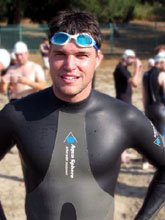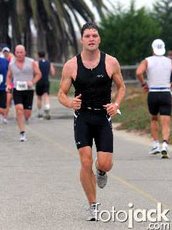Back in 2003 I got in touch with a doctor who used to treat my asthma when I was but a wee wheezy lad in the allergen-rich back woods of rural New Hampshire. In the years since I was a regular patient of his, Dr. Robert Klein had managed to chip away at the ever-growing American asthma epidemic, diligently chasing down every lead in the search for how to control and cure this vexing condition. And although asthma has grown -- significantly -- in the years since (the number of afflicted Americans currently hovers around 20 million), Klein has headed up numerous "asthma camps" for kids dealing with the problem, and, using his parent/child class intervention methods, has virtually singlehandedly cut way down on emergency room visits, missed days of school, and money paid by insurance companies for asthma treatment in his home state of Rhode Island.
Not many physicians are interested in asthma: it's a disease with no sexy cures or surgeries, and little of the nobility or glamour that attends oncology or AIDS research. Attempts at curing even a single patient are often maddening and futile: with no known cure, and a shocking number of new cases developing, sometimes late in adulthood, the focus has to be on controlling symptoms. Asthma disproportionately affects poor and disadvantaged Americans (probably something to do with natural and man-made pollutants in inner cities), meaning that the front lines in the fight against asthma tend to be in not-very attractive places.
Despite these downsides, Robert Klein, bless him, has taken on asthma with a vengeance, and has legions of healthier, more active, less frightened patients -- largely kids -- to show for it.
Dr. Klein and I resumed chatting because he was interested in putting his 30-plus years of clinical experience into a mainstream book about asthma treatment, and he wanted to include -- indeed, foreground -- an exercise program specifically tailored to help control and reduce asthma symptoms.
Although my asthma symptoms had gotten much less severe in the years that I began to exercise seriously, I had never really thought that perhaps I was a legitimate case study; that my results were typical of kids with asthma who exercise. I had thought that my asthma had gotten better in spite of my growing obsession with exercise; in fact, it had more than likely gotten better because of it. Klein pointed me to an interesting study that showed that a disproportionate number of Olympic and professional athletes had asthma. Having asthma, it seemed, was a little like spending your life carrying 30-pound dumbells in each hand: you might not seem fast or strong when you're carrying them, but once you put down the weights -- that is, control your asthma symptoms -- you're stronger than almost everyone because of the extra weight you've been carrying your whole life. Asthma appeared to condition the body to make do on less oxygen, much like training at altitude makes sea-level competition easier for endurance athletes.
Although we hadn't spoken much in over ten years, Dr. Klein and I quickly realized that we had the makings of a good writer/trainer and star-physician team, and that our doctor-patient relationship could serve as a kind of background, cheesy but inspiring tale of triumph over adversity. In the course the next few months, I whipped off a 70-page book proposal, we secured a literary agent, and began shopping our book around to publishers.
The unfortunate upshot was that no one was interested. There are lots of books about controlling asthma on your local Barnes and Noble shelf, but all of them deal with herbal remedies and the like, things you can do that mimic a hospital approach to disease: treat the symptoms when they become a problem. Our book was more preventative in nature, and required a more active participation in the treatment of their disease.
Editors had their own reasons for passing on our book, but I think that what underlay all of them was that they felt readers wouldn't want to take that much responsibility for their health. They wouldn't want to put in the time. They'd rather just take a pill and forget it.
Although it resulted in the rejection of a book I'd spent a year developing, the more pessimistic side of me has to begrudgingly admit that my experience as a trainer -- and observer of peoples' attitudes towards their bodies -- often bears out these editors' point of view. Many people don't seem to want to assume good stewardship of their bodies; as frustrating and expensive as it can be, they'd rather pay exorbitant fees to doctors and pharmaceutical companies, and wade through the quagmire of the American health-care system than to put in a few hours a week on a much more convenient, cost-effective and proven insurance policy also known as exercise.
But the can-do, sunnier side of me sees things differently -- that people do in fact want a sense of control over their bodies, and are happier when they feel that their health is in their hands. One of the strongest indicators of depression in creatures as far down the food chain as rats is a sense of being out of control of your destiny, unable to influence your environment. I wonder if that's not one reason people find hospitals so depressing: as a patient, you simply don't have control; you're at the mercy of the machinery (unless you're my mother, who cajoles, bullies and otherwise railroads doctors into doing whatever procedure and prescribing whatever drugs she deems necessary for whatever condition, real or imagined, that she presents. I don't know how she does it.)
Conversely, taking charge of our health is incredibly empowering and, I believe, healing in itself. In his intensely personal "Cancer Journal," published in the ebook "Liftstrong," Alwyn Cosgrove recounts in real time his internal, psychological fight against the cancer that twice threatened his life. As a former international tae kwon do champion, Cosgrove conceives of his cancer a a ring opponent, writing of his desire to make the disease his "bitch," and to "kick its ass." Cosgrove is a funny writer, but I believe that this kind of thinking -- and very likely the mere act of writing it down -- helped him make his impressive recovery from the disease. Lance Armstrong, who survived an especially advanced and aggressive strain of cancer, fought his disease with a similar singlemindedness-recounted very candidly in IT'S NOT ABOUT THE BIKE -- and equally stunning success. Less famously but no less remarkably, my friend Mia Memel, a skin-care expert who owns and operates the spa-product line "Naughty Mommy," is also a cancer survivor and has spoken to me of getting through the disease very matter-of-factly, facing it down, indeed, almost melting her cancer with an unflinchingly positive attitude that refused to accept the possibility of failure, defeat, or death.
A condition as dire as cancer, of course, is an extreme example. But if in fact this sense of control, of being in charge of their own health as opposed to at the mercy of their disease and their doctors, did in fact help Cosgrove, Armstrong and Memel conquer their potentially lethal condition, then it's worth considering what the rest of us could acheive by taking on a similar attitude towards our bodies on a day-to-day basis.
I have my biases, of course, but I can't think of a better way to assume control of your body, and thus of your health, than exercising vigorously and often. Contrary to the opinions of the editors who respectfully passed on my collaboration with Dr. Klein, in my experience, people often need only a nudge in the direction of an enjoyable physical activity for them to take it on with gusto; I suspect this is particularly true for people with illnesses like asthma or cancer. Most -- though admittedly not all -- people are in fact attracted to the idea of being physical, and of inhabiting their bodies fully rather than haunting them like unwanted guests. The best part of my job is witnessing the transformations that can happen to people as they 'arrive' in a sense, in their own skin.
Subscribe to:
Post Comments (Atom)




2 comments:
I think that just taking a pill and forgetting about it appeals to many people, because much of the information on exercise and nutrition floating around is so bad. Much of it comes from people who have more of a vested interest in selling you something than seeing you become fit.
JD
Agreed; ironic, though, isn't it, that there would be more distrust for fitness folks than for the pharmaceutical industry, which we know is about the most bottom-line driven industry imaginable? Buyer beware in both cases.
Post a Comment